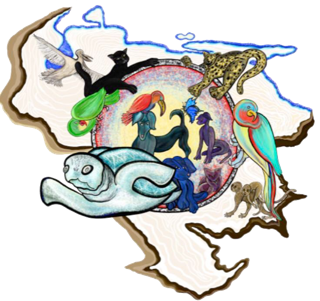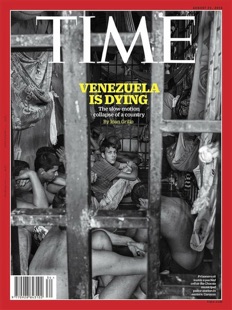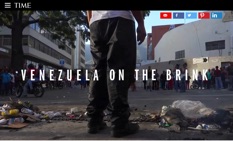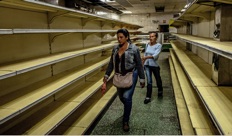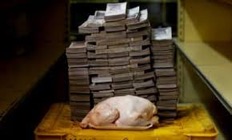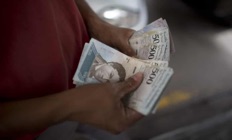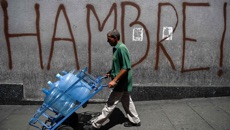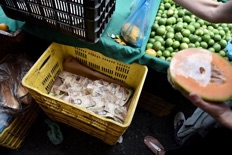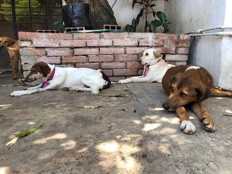
Latest NEWS :
Chicas Productions is a family business, a film production company
founded in 2005 by WOMEN TO EMPOWER ARTISTS


“HELP ANIMALS IN VENEZUELA”



|
|
|
|
|




Los Angeles,


All rights reserved © 2018 Chicas Productions
Website design © 2018 Airam Cordido / Translation by Chicas Translations


|
|
|
|
|

|
|
|
|
|
|
|
|
|
|
|
|
|
|
SITUATION
Shortages in Venezuela of regulated food staples and basic necessities have been widespread following the enactment of price controls and other policies under the government of Hugo Chávez and exacerbated by the policy of withholding United States dollars from importers under the government of Nicolás Maduro.
The severity of the shortages has led to the largest refugee crisis ever recorded in the Americas. The Bolivarian government's refusal to accept offers of aid from Amnesty International, the United Nations, and other groups has made conditions even worse.
There are shortages of milk, meat, coffee, rice, oil, precooked flour, butter, toilet paper, personal hygiene products and medicines.
Hours-long lines have become common, and those who wait in them are sometimes disappointed.
HUNGER
The annual "Venezuela's Living Conditions Survey" (ENCOVI) by three universities found nearly 75% of the population said they had lost an average of at least 8.7 kg (19.4 lbs) in weight due to a lack of proper nutrition in 2016 and 64% said they lost 11 kg (24 lbs) in 2017. When the price of petroleum was high, Venezuela became dependent on food imports, and once the price declined the government became unable to afford the imports. Following the fall in the price of petroleum, food rationing grew so severe that Venezuelans spent all day waiting in lines. Pediatric wards filled up with underweight children, and formerly middle-class adults began picking through rubbish bins for scraps.
According to the head of waste collection in the city of Maracaibo, 6 out of every 10 garbage bags or trash cans are being looted by hungry people. Other signs of hunger in Venezuela include the killing of dogs, cats, donkeys, horses and pigeons—whose dismembered remains are found in city garbage dumps—and of protected wildlife such as flamingos and giant anteaters.
Corruption is a problem in the distribution of food. According to an operations director at one food import business, "You have to pay for [the military] to even look at your cargo now. It's an unbroken chain of bribery from when your ship comes in until the food is driven out in trucks." While using the military to control food distribution has "drained the feeling of rebellion from the armed forces" by giving soldiers access to food denied others, the resulting corruption has increased shortages for the general public.
Doctors at "21 public hospitals" across 17 Venezuelan states told investigators of The New York Times in 2017 that "their emergency rooms were being overwhelmed by children with severe malnutrition—a condition they had rarely encountered before the economic crisis began", and that "hundreds have died". The government has responded with "a near-total blackout of health statistics, and by creating a culture in which doctors are often afraid to register cases and deaths that may be associated with the government’s failures".
INFLATION
Inflation in Venezuela remained high through Chávez presidency's and towards the end of his tenure. By 2010, wage increases began to be futile since inflation would simply remove any advancement. Inflation rate in 2014 reached 69% and was the highest in the world. The rate then increased to 181% in 2015, 800% in 2016, 4,000% in 2017 and 200,005% in 2018.
In November 2016, Venezuela entered a period of hyperinflation. The Venezuelan government "has essentially stopped" producing official inflation estimates as of early 2018.
Inflation has affected Venezuelans so much that in 2017, some people became video game gold farmers and could be seen playing games such as RuneScape to sell in-game currency or characters for real currency. In many cases, these gamers made more money than salaried workers in Venezuela even though they were earning just a few dollars per day. In the Christmas season of 2017, some shops would no longer use price tags since prices would inflate so quickly, so customers were required to ask staff at stores how much each item was.
In August 2018, President Maduro announced that the country will issue a new currency, the sovereign bolívar, which will replace the current paper bolivar with currently with 1/100,000 numerical value (a 100,000 bolivar note becoming a 1 sovereign bolivar note), in an attempt to curb hyperinflation, coming on the heels of a 3,000% minimum wage hike intended to stanch the exodus of economic refugees. Venezuelans lined up at ATMs to collect the new currency, but they’re limited to withdrawals of 10 sovereign bolivars per day. The new and old currencies are in circulation simultaneously, confusing vendors and citizens.
Venezuela’s inflation rate is on track to hit 1,000,000% this year, which the IMF has compared to the hyperinflation seen in Germany in the 1920s and Zimbabwe in the 1990s. Just last week the inflation rate was 32,000%.
Previously, the official foreign exchange rate was about 250,000 bolivars to one U.S. dollar. But on the black market, a dollar cost upwards of 3.5 million bolivars. Currency traders interviewed by Planet Money were in hiding after helping Venezuelans exchange their bolivars for dollars in an online market. But who was buying the increasingly worthless bolivars? Government officials who had access to the official foreign exchange rate.
Sept. 2018: http://time.com/venezuela-brink/
Getting food and medicine has become a daily preoccupation here. Most Venezuelans go to bed hungry or are eating less due to food shortages, and moderate to severe malnutrition of children under 5 increased in 2017. Venezuela’s health minister released data last year indicating that, in 2016, maternal mortality increased 65 percent, infant mortality 30 percent, and malaria cases 76 percent. Days later, President Nicolás Maduro fired her.
IMF economists are predicting that Venezuela’s inflation rate could exceed 1,000,000% this year.
Hyperinflation is the term used to describe prices spiraling out of control, accompanied by plunging currency values – leading consumers to require wheelbarrows full of money to buy everyday essentials.
In theory, prices should always fluctuate depending on supply and demand. Inflation is the term for rising prices, while deflation describes prices falling. Hyperinflation occurs when prices rise so wildly as to render the concept of inflation absurd.
HYPERINFLATION & PRICES
The problem comes when the supply of paper money in an economy outstrips demand for goods and services, causing the value of the currency to fall. This occurs when governments create new money to finance spending above their income from taxation.
Hyperinflation in effect destroys purchasing power and encourages hoarding of goods, as people and businesses anticipate further price increases. Periods of hyperinflation tend therefore to be self perpetuating, as shortages further drive up prices.
Lack of certainty over prices removes the incentive for buyers and sellers.
The Times reports that restaurant owners in Venezuela no longer have menus with printed prices, while supermarkets have also removed prices from shelves.
Many people use cards to buy goods rather than cash.
Why is it bad for an economy?
Hyperinflation removes the certainty that a paycheck will be enough to meet living requirements, as prices rise to erode the value of wages.
HOW ABOUT PEOPLE SALARIES?
Aware of this problem, some Venezuelan companies have started offering unusual compensation packages, such as bonuses paid in eggs. Foreign currencies, retaining their stability, can also be used.
Venezuela minimum wage up 155 percent, down 13 percent in dollar terms after new currency.
Sept. 2018. Venezuela raised its minimum wage to 1 800 sovereign bolivars per month, the fourth increase this year that puts the figure at just $18.9 USD at the black market exchange rate.
A retired person that worked all her life gets 1 800 sovereign bolivars but ONLY 90 sovereign bolivars in cash as retirement (less than $1 USD at the black market exchange rate) .
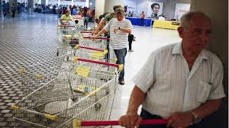
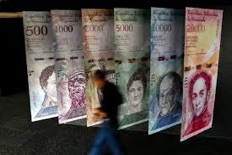
Hyperinflation removes the certainty that a paycheck will be enough to meet living requirements, as prices rise to erode the value of wages. In addition to lopping five zeros off of Venezuela’s unit of account, the sovereign bolivar is supposed to be linked to the petro, Venezuela’s cryptocurrency, which is supposed to be anchored to a barrel of oil. So, if the sovereign bolivar works as advertised, Venezuela would move from issuing an irredeemable fiat currency to issuing a commodity-backed redeemable currency. But, Venezuela’s petro is dysfunctional and considered a scam, not a currency.
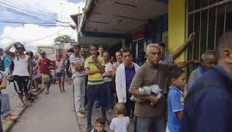
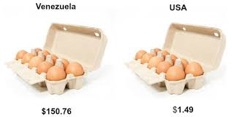
2nd MISSION: acquire food, medicines and basic necessities
+ distribute them to our families, friends, friends of friends in Caracas.
3rd MISSION: create fair trade jobs for sustainability
-
*FOR THE FOOD: Adriana and Gabby are the ONES that are able to find food in Caracas as they both have a big network of friends. Adriana is living there. Gabby emigrated to Lima, Peru 4 months ago.
And in Los Angeles we’ll organize a Charity Event to COLLECT and SHIP a whole container of NON-PERISHABLE FOOD, VITAMINS, BASIC NECESSITIES for people and animals CLOTHES, SHOES, BABY PAMPERS and TAMPONS and PADS for women, and everything we can send through Olarte Transport.
-
*FOR THE MEDICINES: This is very complicated. We recently lost a friend that was battling lupus. The treatment could not be found and when someone could find it 1-day treatment would cost $40 USD. So nobody could afford to pay. Our friend she was in her 40’s. She was a beautiful make-up artist. And she died because of this government. Our friend Anairis in France she is able to buy her mum’s cancer treatment and to send it to her in Caracas through the Red Cross in Paris. For our Nana Lourdes Gabby could find her treatment in Lima and send it to her through a relative that was traveling to Caracas. It takes a lot of energy to find the medicines and to deliver them to our families and friends. We have also used Olarte Transport fo send medicines from Los Angeles and Miami.
-
*Adriana and her team of crocheters are paid for each AMIGURUMI and BIKINI made and sold in US Dollars (more than 2 times the minimum wage at the black market exchange rate EACH) so they are very happy.
-
*Adriana, my aunt Maria and Aaron, Gabby’s other brother are our shoppers for the WAYUU hats, bags and pompoms. As the WAYUU is a Native American ethnic group of the Guajira Peninsula in northernmost part of Colombia and northwest Venezuela. Adriana, my aunt Maria shop in Caracas and Aaron, who emigrated to Colombia few years ago, shop for us un Medellin. They are paid in US Dollars (more than 2 times the minimum wage at the black market exchange rate per item).
-
*Adriana, and Cesar they both get a FOOD BOX each time we can find and distribute food for helping us with the food handling and preparing for delivery.
-
*Gabby is also able to make some money in US Dollars by helping us exchange our dollars and euros into sovereign bolivars.


DONATE & GET A GIFT BOX
YOUR SUPPORT WILL HELP US
“HELP ANIMALS IN VENEZUELA” THANK YOU ❤
Our goal is to help existing independent animal rescues like
“Mascoayuda”, “Peludos de la Costa de Oro”, “SOS Patitas”,
“Fundación Huellita de Amor”, “Enrique Rios Rescate Animal”, etc.
and to help collect and ship food, medicines
and basic necessities for distressed animals.
1st MISSION: help independent animal rescues attend ANIMAL EMERGENCIES in Venezuela
+ collect and ship food, medicines and basic necessities for animals
-
*Our entire family has always been animal lovers, we have always had pets, and my mum Maru has always saved every animal in distressed we have found. A lot of pets are abandoned in the streets because their owners don’t have enough food for themselves so they cannot feed their loved pets.
-
*
-
*Priorities:
1- To attend EMERGENCIES
2- To acquire, collect and ship non-perishable food, medicines, basic necessities, toys.
-
*Adriana, and Cesar they both love animals will help distribute animal food to people in need with help of other local neighbors.
Sept. 2018: https://www.washingtonpost.com/
